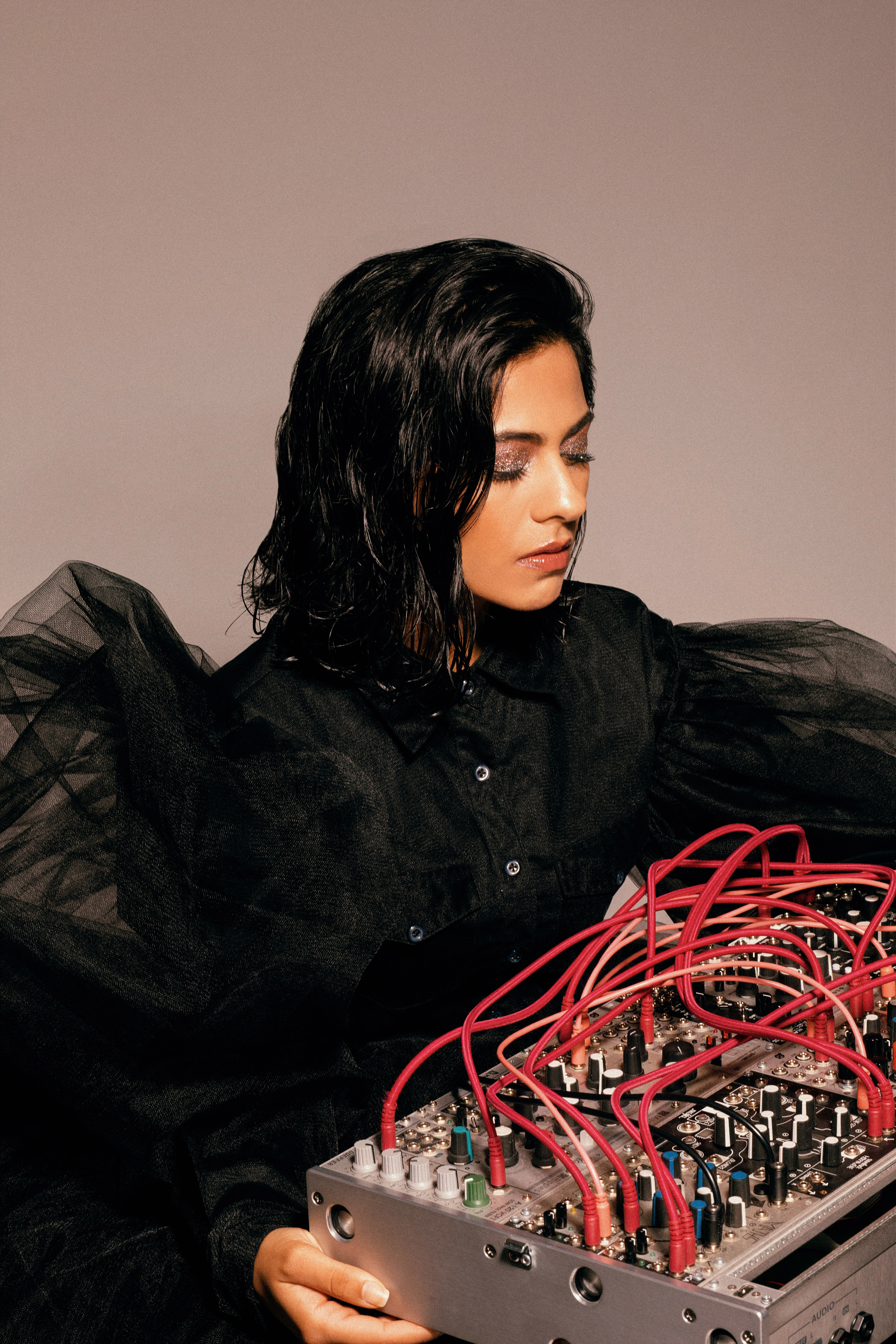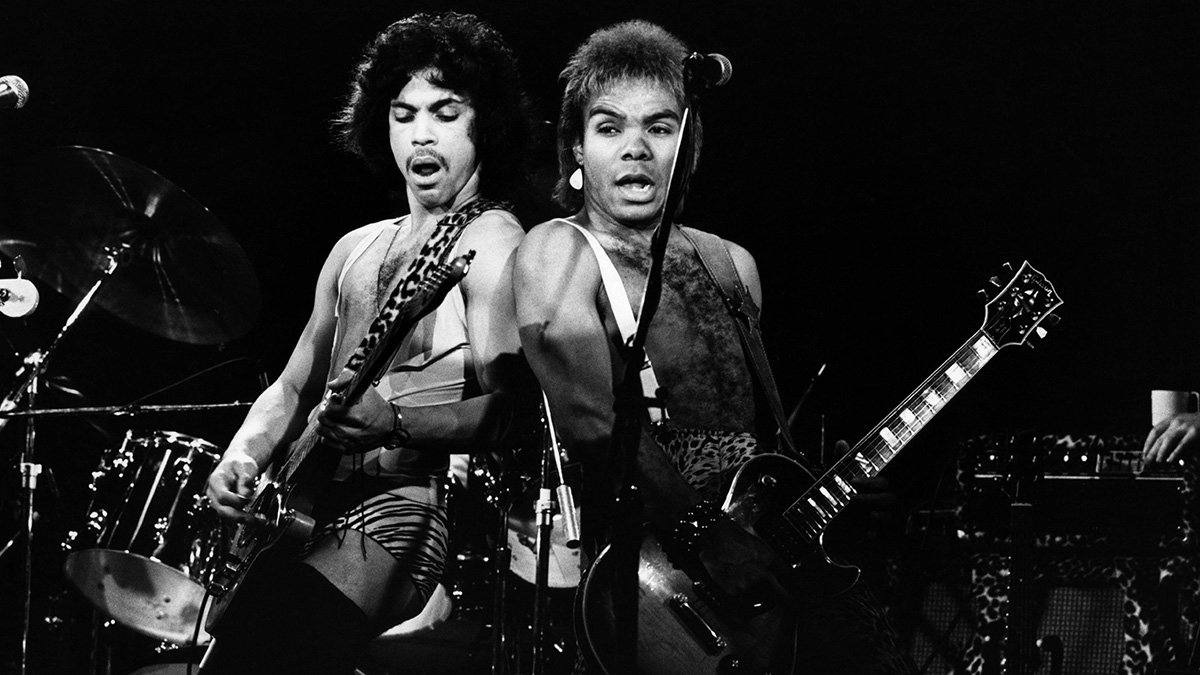"I’m speaking a musical language with the modular synthesizer as my pen": Meet Arushi Jain, the "modular princess" using synths to reimagine Indian classical music
Delight is the mesmeric new offering from modular synthesist, composer and singer Arushi Jain. Hamish Mackintosh sat down with Jain to find out more

Earlier this year, Arushi Jain followed up her critically acclaimed debut 2021 album Under the Lilac Sky with a sublime new project, Delight, featuring nine new offerings of her modular-centric, raga-tinged electronic delights - if you’ll pardon the pun.
With the addition of marimbas, cellos, piano, flute and classical guitar, Jain has widened her sonic palette whilst strengthening her vision and cementing her reputation as one of the rising stars in the electronic firmament. So, take a deep breath, dim the lights and lose yourself in the modular wonders of Delight.
Delight has to be one of the most aptly named albums ever…how long did it take to put it all together?
"So, I started getting in the mood with Raga Bageshri [a raga that references the feeling of wanting to reunite with a loved one] sometime around 2020 but I didn’t write my first track until June or July 2022. It took maybe a year to fourteen months to write the whole thing."
When you start writing new material do you envisage it being for an album or do you just write?
"Yeah, I often think of projects or moods. With this, I was initially trying to write a shorter EP but as I was writing it, I felt that the idea was incomplete, so I needed to write more. I kept adding more stuff, so it just grew from there."
So, it’s a case of going with the flow?
Get the MusicRadar Newsletter
Want all the hottest music and gear news, reviews, deals, features and more, direct to your inbox? Sign up here.
"There’s the idea of that flow state but also there’s that question of ‘is the sentence complete’? Do you have more words? Those are two separate things but they both matter. I felt both were true, so I added more words and I was enjoying completing the sentence. To be honest, I wrote most of the music in a few months, but it took me the extra time to finalise it. I literally added Play in the Void 3 days before I sent it off to my mastering engineer. [laughs] That’s my style really… I’m always tweaking!"
Your wonderful Boiler Room set during lockdown was an entrancing introduction to your music for many people. Were the lockdowns a creative period for you?
"Oh yes. The lockdown was great for me as I finished writing Under the Lilac Sky and started doing research on this new album at the same time. I didn’t think of it like that though, as I was just ‘in’ music… it was great.
"I miss having temporal spaces like that where there is nothing to do except ‘do’, if you know what I mean. It was super-creative because I think it helped people look internally. I struggled with it in some ways but, overall, I had this thing that I wanted to spend time on."
What was the core of your set-up for writing Delight?
"Honestly, from a hardware perspective, it’s not that complex. I used a couple of granular processing modules that I used to process my voice through and some of the instrumentalists that I’d recorded too. I worked with a cellist, marimba player, a flautist, a saxophonist and a classic guitarist so I used the recordings I’d made with them and put them through the granular modules and also through a bunch of reverbs and delay modules that I have. I had the MIDI patterns and melodies that I’d composed which I then sound-designed through the modular.
The way I work is like a multi-phase process. The initial phase is the mood and the melodies and once that’s arranged, I do the sound design
"The way I work is a multi-phase process. The initial phase is the mood and the melodies and, once that’s arranged, I do the sound design. With the synth, I do the sound design layer by layer. I change my patch for each different layer, which keeps it fun for me and also gives me a lot of different ways of saying the same thing. I take some space away from it then listen back to the first round of sound design in a couple of weeks, take notes and go back to it. A lot of the modules I use are probably the same as I used on Under the Lilac Sky, other than the granulators."
Such as?
"I used my Make Noise DPO, my Mangrove from Mannequins, my Mutable Instruments Plaits… I used all of these modules for earlier stuff too but I think it’s more the way it’s layered that matters. The music on Delight is a little slower and more patient so I was more interested in doing drone-ish design, as compared to the first album, which has way faster melodies.
"I was more interested in how I could make a single note evolve. I used a lot of longer shapes with the Zadar Quadruple envelope generator. I also basically mapped a MIDI controller to a module. There’s a company called Expert Sleepers that make these highly customisable modular units, and you can map them with MIDI."
Anything else different with your workflow for this album?
"I made sample sets with the acoustic instrument recordings. In some songs you hear the whole saxophone. I gave the saxophonist sheet music that I’d composed, which I took longform and it’s playing in one of the songs but I also chopped it up into short units then I’d process them through the modular.
"There was a little prep work required as the phrases needed to be cut up in a way that the ideas were complete. Once I’d done those it was a case of how I wanted to process them. The melodic ideas have a shape and are consistent with the raag."

Did you process a lot of your vocal ideas in a similar fashion?
"I recorded myself singing a lot of phrases of the raag then processed them through a Digitakt and some other things to create a jumpy, percussive vibe. This album is the first time I really did sampling in this way where I was preparing sample sets. One of the tracks even has a sample synthesizer that I made from a harmonium from back home. I recorded each individual note then made a sampler out of it.
"I also played with noise a lot more. What I do with technology is like building blocks that could lead to a dead-end or could sound really interesting - it’s an experiment."
Do the fine margins of working within a modular environment mean it can be easier to lose an idea you’re working on?
"For sure. That’s why I have versions of every song that are very different. I record it all, which can get overwhelming. If it’s lost then it’s lost, although my writing process is quite slow and methodical because I don’t want to lose what’s happening. I tend not to record until I’ve found something that I think is cool, which I’ll then record without making many changes, then layer it."
How did you first encounter modular synths?
"I had a couple of friends from college who had a modular rack but I was nervous to ask them about it as it seemed almost like a secret or something. I was on the lookout for an instrument that would help me to understand the world of sound design; something that was flexible and would give me complete freedom and I wasn’t finding that in the pre-routed synthesizers that I had access to.
A lot of people find modular overwhelming or think it’s too technical but I decided a long time ago that it was my thing
"I was in India and a friend introduced me to another friend who had a modular and I asked if I could mess around with it. I went to his studio and messed around with the rack and, two minutes in, I knew that this was what I was looking for! I wanted something very customisable and logical and I didn’t want to read long manuals to make a sound. That’s not my style… I just want to be able to plug the oscillator into the speaker and go from there. I like building from bottom up. That’s just how my brain works."
Do you think that the thought of modular synths sometimes puts people off starting to explore them?
"I think a lot of people find it overwhelming, or think it’s too technical, but I decided a long time ago that it was my thing. I like technology and learning about how things work. I don’t feel intimidated when something looks complicated. But I had to teach myself."
Your background in computer science must be a big help?
"Definitely. It’s just mental models that translate and also about me, initially, not being intimidated or feeling uncomfortable when I walked into a room as the only girl."
What was your first modular purchase?
"Once I’d decided it was my instrument, I got back to the Bay Area and was looking around for cases on Craigslist and I found someone selling this beautiful custom Bastl case. A friend drove me to South Bay and the guy selling it was a filmmaker with three rooms full of modular…it was insane! [laughs] I did wonder what I was getting myself into.
"I probably should’ve done a bit of research but I ended up buying a bunch of stuff from him: my case, an Erica Synths wavetable oscillator, the Make Noise Wogglebug random voltage generator as well as a Make Noise Pressure Points to use as a sequencer. I got a utility module for audio out conversion. I also got a Pamela's New Workout clocking modulator from ALM, the original version. The case is beautiful, my favourite case ever. I learn by doing - so once I started working on it, I was off."

Will you be that film director in a few years’ time with rooms full of modules and synths?
"[laughs] First of all, I don’t have enough money to be doing that… I swear he had at least $100k worth of equipment in there. Of course I’ve got more modular than I did five years ago, but I think of it as function and inspiration. Modules can serve a specific function that you’re missing or they can lead you to a world you might never have known exists.
"I try not to buy modular until I have something to do with it. By that I mean that if I’m working on a new album then I’ll try to get a few things that will lead me to discovery. If I’m going on the road and I need some new modules for function, then I’ll get them. Those are the only reasons why I’ll get new modules. I think restraint is really important. I also think when you get too much stuff at once you can’t really learn it properly."
Headfirst into a new world of sound and trial and error?
"I don’t hate modules but I hate if I’m being impeded because of the design. I read all the manuals, I study them, I take notes - I like documentation, it’s fun for me. The basic features of gear should be obvious, then if you want people to use the special features and effects then it’s valid to read the manual. If I just have, say, an oscillator module but I can’t get a sound wave out of it until I read the manual then that’s weird - that’s bad design."
The modular renaissance has spawned myriad new boutique module companies. Does it sometimes get confusing knowing what you actually need rather than just things you’d like?
"Yes, but it’s not an end in itself, it’s there to write music with. That’s the biggest reason that I’ve got restraint because, if I’m not writing music with it then what am I doing? I’m not here just to geek out about the hardware. That’s not my vibe.
"Of course, I like working with the hardware and reading the manuals but that’s all so that I write music. I think there are a lot of people who just like modular for the gear but that’s not why I’m drawn to it. I do feel comfortable with it because it’s technical and I do enjoy the ‘how does this work’ energy it gives me - but it’s there to write music with."
Do you use much software in amidst all the hardware?
"I do use software. The computer is such a big part of my brain and I spent those years studying it. I use a lot of effects within Ableton, and I’ve done a lot of different types of sequencing: with a piano, with various hardware sequencers, with code and with MIDI data in Ableton. It’s all a way of inputting data into the system so it doesn’t really matter that much to me what’s doing the actual sequencing."
Any favourite plugins?
"I love all of the Valhalla plug-ins. They’re so good for the type of music I write. I also really like Cableguys’ Pancake modulator."
What about your vocals - do you have a particular mic and effects combination?
"[laughs] No, I use an Audio-Technica 2020. It’s an entry-level condenser mic…nothing fancy. I have a reflection filter around the mic so I don’t grab a bunch of other stuff but, to be honest, sometimes I like the air of the room. Processing-wise, I use Valhalla Shimmer, a Native Instruments delay and that’s it."
Do you think that the elements of classical Indian music and its ragas lend themselves well to the modular/electronic format?
"I guess so. The thing is that I just work within a language; I’m speaking a musical language with a modular synthesizer as the pen. I don’t have any other language and I don’t have any other pen. So, it’s not Indian classical music, it’s just a way of understanding sound. It’s a framework within which to make sense of frequencies.
"I couldn’t really write any other type of music, even if I wanted to. I think the modular synthesizer is very free and very freeing and that’s what writing music is supposed to be. It’s supposed to be that anything is possible and that’s always the feeling I have when I work with this instrument."











